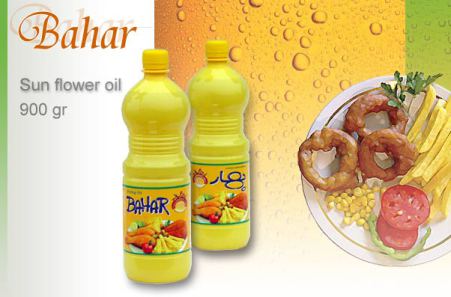Sun Flower Oil
Advantages
No cholesterol
Clear in cold weather
Filled under nitrogen gas for increasing preservation time and inhibition from rapid oxidation
Without Taste and Smell
Without any insoluble impurities, waxes and minerals
Clear appearance
Suitable for different kinds of sauces and salads
Excellent for cooking
Decreasing bad (LDL) to good cholesterol (HDL) ratio
Protect against heart failure
Lower oil consumption due to higher boiling point
Suitable packaging for inhibition of rapid oxidation
Incomparable oil for sensitive, dry or damaged skins
More information
Sunflower is an oil seed, which is grown primarily in North American
regions. Sunflower has become number one oil by preference among consumers and chefs since it has proven to be an excellent vegetable oil both in terms of its healthy characteristics and
applicability for a wide variety of uses: Salad dressings, frying and baking. Its smoke point (fuming temperature) at 230ºC (higher than any other leading vegetable oil) is another important benefit
for frying operations.
Sunflower oil has a very Low level of saturated fat which helps to reduce
blood cholesterol level. Among all leading vegetable oils, it has the highest level of unsaturated Fat of which 72% linoleic acid, one of the essential polyunsaturated fatty acids required by the
human body. These fatty acids have an important role in lowering blood triglyceride level, which can decrease coronary heart disease risks.
Sunflower oil is a rich natural source of vitamin E which is an
anti-oxidant.
Studies have shown that sunflower oil is healthier than most other food oils
on the market. There are two types or classifications of sunflower oil: linoleic sunflower oil and high oleic sunflower oil.
Linoleic sunflower oil is the original sunflower oil and until recently has
been the most common type of sunflower oil. It is a polyunsaturated oil with low saturated fat levels, a clear, light taste and is high in Vitamin E. This type of sunflower oil is predominantly (65%)
polyunsaturated. The type of polyunsaturated fat it contains is linoleic acid (an omega-6 acid) and is one of two essential fatty acids. Our bodies need this essential nutrient but can’t make it. So,
it must be supplied by food sources. This sunflower oil contains monounsaturated fats (oleic) at 21% and a low saturated fat level of 11%. Linoleic sunflower oil is a healthy, delicious vegetable oil
choice.
Linoleic sunflower oil is available as a liquid salad oil and is used in
margarine and shortening applications. Home users find it an excellent choice for any liquid oil application such as dressings, frying and baking. Because of the high levels of polyunsaturated fats
in linoleic sunflower oil, the oil is susceptible to oxidation during commercial usage, especially frying. Like other highly polyunsaturated oils, such as soybean and canola, it can be hydrogenated
to a more stable form.




